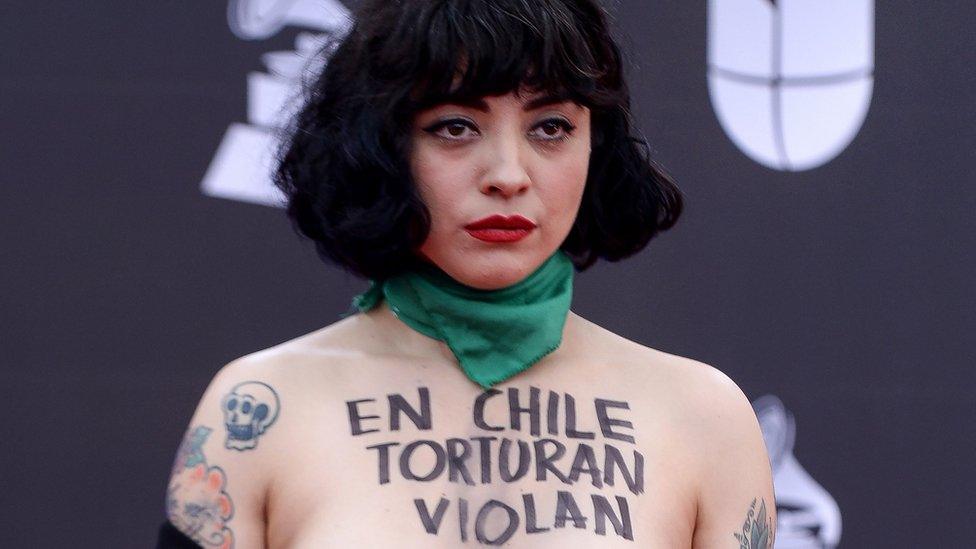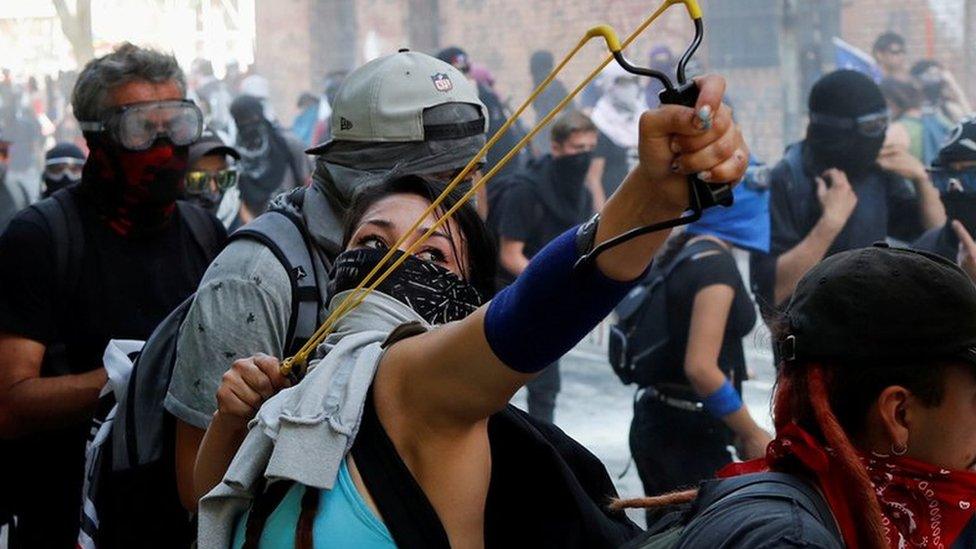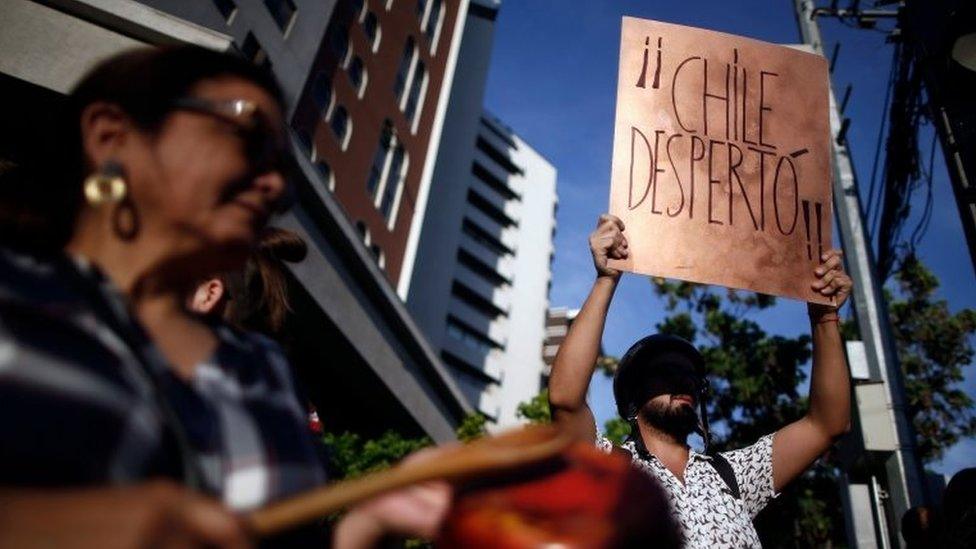Mon Laferte: The Chilean pop sensation challenging repression
- Published

Chilean singer Mon Laferte staged a protest at the Latin Grammys in November 2019
Chile's biggest pop export, Mon Laferte, is known for speaking her mind and going to great lengths to do so.
Her latest album, Seis, is her most intimate and courageous yet; tackling complex topics such as misogyny, repression, and injustice, inspired by her lived experiences.
It comes at a time where Laferte, more than at any other point in her career, has emerged as a polarising figure in Latin America.
The three-time Latin Grammy award winner is unafraid of alienating her more conservative fans by rallying for women's rights and calling out institutionalised abuse.
At the 2019 Latin Grammys, she painted "In Chile, they torture, rape and kill" on her exposed breasts to decry human rights abuses after protests over inequality, healthcare and education were violently repressed. Thousands of civilians were injured, including hundreds who suffered eye trauma by police weapons, and dozens killed.
1.2mnumber of people estimated to have taken part in the largest demonstration
Dailydemonstrations were held for a month to protest against high levels of inequality
Hundredsof protesters suffered eye trauma from pellets fired by police
Protestscarried on for months and only subsided when the pandemic hit

Laferte sided with the movement's demands and joined the protests: "I come from a poor neighbourhood in Chile," she says. "There are not many opportunities."
Around the same time, Chilean police took legal action against her for suggesting, in an interview, that armed forces were complicit in arson and looting during the unrest.
Laferte responded to the charges, which were later dropped, while headlining a televised festival: "If they want to arrest me for saying what I think, let them arrest me," she announced.
Her concert made headlines for its political overtures. She showed solidarity for the victims of police violence and denounced how the state had tried to silence her. The crowds cheered with popular protest chants.
If this was Laferte's cumulative showdown with the state, she was the one who walked away with her head held high.

Mon Laferte (embracing a fellow artist) called on Chileans to "resist on the street" during a concert
But less than a month later, she was eventually forced into silence - not by the Chilean authorities, but by the pandemic.
Seis was written in the isolation of lockdown. Laferte would spend her days at home in the quiet mountain village of Tepoztlán, Mexico, accompanied with nothing more than the rugged voice of popular Mexican singer Chavela Vargas, swigging a bottle of tequila, and playing her guitar.
"I think the pandemic meant that a lot of people stayed home listening to albums, taking the time to enjoy them more," said Laferte, who has lived in Mexico for the past 14 years.
It is the first album Laferte has released since the Chilean protests, and she cites Vargas as her core inspiration: "I'd always felt a connection to her."

The late Mexican singer Chavela Vargas was an inspiration for Laferte's new album
Vargas, who passed away in 2012 at the age of 93, was a revolutionary figure who rose to fame in the 1950s.
Known for her sweeping renditions of traditional Mexican ranchera ballads, she sang with staggering emotion, weaving reflective quietness together with dramatic climaxes.
Her songs of love and heartbreak were deliberately addressed to women, and at 81, she publicly came out as a lesbian.
"I valued her solitude," Laferte explains, appreciating the silences in Vargas' songs as "moments of meditation".
Seis re-envisions Mexico's musical traditions to explore a more modern reality "of the Mexico that I know, a Mexico that is much freer" says Laferte, who reveals there is a queer subtext to the album.
The single Que se sepa nuestro amor (let our love be known) addresses the freedom to love, unconventionally and openly. Laferte, who prefers to avoid labelling her sexuality, casually affirms "I can love and desire anyone".
She believes there is still a strong pressure to love conventionally, "especially in this part of the world" - referring to Latin America, where Catholic beliefs are still strongly influential.
Laferte's interest in confronting societal standards is a recurring theme in her new album.
In La mujer (the woman), the lyrics celebrate women for who they are, "and not what society expects us to be," she explains.
The video for the song, which features Mexican singer Gloria Trevi, shows an astronaut clumsily attempting to mast a flag next to Laferte. "It is a space that does not belong to him," she adds.

Mon Laferte wrote her latest album Seis in Mexico during the lockdown
Seis also includes songs she wrote during the Chilean protests, a time when Laferte suspended her scheduled activities to spend time in her homeland, playing free shows throughout the country.
She wrote the song Se va la vida (life slips away) after singing at a women's prison in Valparaíso, a port city near to where she grew up.
"After I left, I was filled with rage. They jail poverty, people who are excluded from society," she says. "There is such little empathy."
Charged with melancholy and despair, the track laments the life that has been taken away "from little girls and grandmothers", locked in cells "where cement cries over injustice".
Toward the third minute, the listener is duped into anticipating the song's end as the vocals slow and quieten, before the tremendous brass orchestra of Mexican female collective Mujeres del Viento Florido sweeps the song into a powerful climax.
One of the accomplishments of Seis lies much in what Vargas achieved before her - exploring the depth of traditional Latin American music and imprinting intensely personal experiences upon them to reflect different realities.
"It is a great opportunity that people can listen to traditional music but hear vanguard topics through a lyric," she says. "I like to open up the conversation".

You may be interested in watching:
February 2020: Masked protesters set alight cars outside the venue of Latin America's biggest music festival
Related topics
- Published15 November 2019

- Published26 October 2020

- Published23 October 2019
